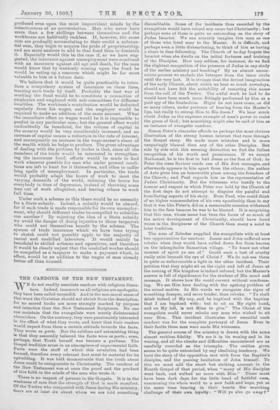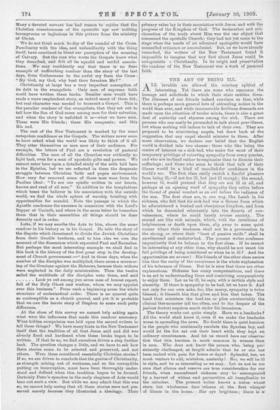THE CANDOUR OF THE NEW TESTAMENT.
WE do not readily associate candour with religious litera- ture. Indeed, inasmuch as all religions are apologetic, they have been called uncandid. And in the non-moral sense of that word the Christian should not shrink from the description, for no sacred books are more strongly marked by purpose and intention than the New Testament Scriptures. No one can maintain that the evangelists were merely disinterested clmoniclers. On the contrary, they were passionately interested in the effect of what they wrote, and knew that their readers would expect from them a certain attitude towards the facts. They wrote ex park. But the sublime and astonishing thing is that they assuredly believed the facts were ex park; even, perhaps, that Truth herself was become a partisan. The Gospel tradition arose in an atmosphere of experimental faith. Facts were the stuff of which this revelation had been formed, therefore every relevant fact must be material for its upbuilding. It was held inconceivable that the truth about Jesus could be antagonistic to Christianity. The candour of the New Testament was at once the proof and the product of this faith in the minds of the men who wrote it.
There is no reaped of persons in the Gospels. It is in the weakness of men that the strength of God is made manifest. Of the Twelve who conipanied with Jesus during His ministry, there are at least six about whom we are told something discreditable. Some of the incidents thus recorded by tbe evangelists would have ruined any cause but Christianity ;• but perhaps none of these is quite so astounding as the story of Judas Iscariot. We can scarcely imagine this man as one of those who lived near to the Master. It is difficult, and perhaps even a little disheartening, to think of him as having a share in that fellowship. The Church of to-day forgets the Iscariot when she dwells on the initial fortunes and training of the Disciples. How very seldom, for instance, .do we find the slightest recognition of the presence of Judas in any study of the earlier ministry and teaching? By an almost uncon- scious process we exclude the betrayer from the inner circle until the very last. It is strange that the devout imagination
of the early Church, about which we hear so much nowadays, should not have felt the suitability of removing this name from the roll, of the Twelve. The awful work he had to do would have been much more fittingly performed by him as a paid spy of the Sanhedrim. Might he not have come, as did so many others, under pretence of hearing from the Master's lips, but really to entrap Hiui to His doom ? We hear much about Judas as the supreme example of man's power to resist the grace of God ; but something might also be said of him as an instance of evangelic candour.
Simon Peter's character affords us perhaps the most obvious illustration of the strong human interest that runs through the Gospel story. He made 11141re mistakes and is more
unsparingly blamed than any of the other Disciples. But side by aide with this seeming detraction we find the fullest
recognition of his worth and prominence. If we except
Nathanael, he is the first to hail Jesus as the Son of God; to Peter the risen Saviour sends one of His first messages, and afterwards appears to him apart from the others ; the author of Acts gives him an honourable place among the founders of the Church; and Paul regards him as the representative of Judaic Christianity. But the witnesses who testify to the honour and respect in which Peter was held by the Church-of the first days do not attempt to disguise the painful and humiliating aspects of his story. Even Paul, who couldthink of no higher commendation of his own apostleship than to say that it was like Peter's, did on a memorable occasion withstand
him to the face because he was to be blamed. It is surprising that this man, whose name has been the focus of so much of the active development of Christianity, should have fared worse in the Scriptures of the Church than many a saint in In ter tradition.
The sons of Zebedee supplied the evangelists with at least two opportunities for candour. James and John suffered sore rebuke when they would have called down fire from heaven on the inhospitable Samaritan village. "Ye know not what manner of spirit ye are of." Could such a lust of cruelty really exist beneath the eye of Christ ? We do not see them
in quite so unfavourable a light in the other incident. Their petition that they might sit on the right and left of Jesus at
the coming of His kingdom is indeed refused, but the Master's
answer is full of significance for the student of His 'mind and message. It shows how He could correct without condemn- ing. We see Him here dealing with the agelong problem of the mixed motive. In His words we recognise the signs of something deeeper, and more tender, than rebuke. "Ye shall
drink indeed of My cup, and be baptized with the baptism
that I am baptized with; but to sit on My right hands and on My left, is not Mine to give." The Christ of the
evangelists could never rebuke any man who wished to sit near Him. This incident illustrates how essential such -candour was for the complete portrayal of Jesus. Even in their faults these men were made His witnesses.
The general course of the ministry is drawn with the same almost reckless fidelity. We see it in its waxing and in its waning, and all the cheeks and difficulties encountered are as carefully recorded as the triumphs. The outline given seems to be quite untouched by any idealising tendency. We have the story of the opposition mot with from the Baptist's disciples, and the passing hesitation of John himself. To .
this we must add the short but striking account in the Fourth Gospel of that period, when "many of His disciples went back, and walked no more with Him." These must
have been dark days for the little band of faithful ones, summoning the whole world to a new faith and hope, yet at the same time bearing in their hearts the searching challenge of their own loyalty : "Will ye also go away P"
Many a devoted servant has had reason to rejoice that the Christian conseiousness of the apostolic age saw nothing incongruous or inglorious in this picture from the ministry of Christ.
We do not think much to-day of the scandal of the Cross. Familiarity with the idea, and unfamiliarity with the thing itself, have combined to blunt our perception of the meaning of Calvary. But the men who wrote the Gospels knew what they described, and felt all its squalid and sordid associa- tions. We may confidently say that there is no finer example of unflinching candour than the story of the last days, from Gethsemane to the awful cry from the Cross : "My God, my God, why bast thou forsaken Me P" Christianity at large has a very imperfect conception of its debt to the evangelists. Only men of supreme faith could have written these books. Smaller men would have made a more resplendent story, as indeed many of them did; but real character was needed to transmit a Gospel. This is the peculiar candour of the. evangelists, that they set out to tell how the Sen of God came among men•for their salvation, and when the story is unfolded it is—what we have seen. These were His friends; these His conquests; and this His end.
The rest of the New Testament is marked by the same outspoken confidence as the Gospels. The writers•never seem to have asked what the world was likely to think of it all. They utter themselves as men sure of their audience. For example, the letters of Paul are a revelation of pastoral difficulties. The care of all the Churches was • evidently no light task, even for a man of apostolic gifts and powers. We cannot enter here upon a detailed study of the evils laid bare in the Epistles, but we see reflected in them the desperate struggle .between Christian faith and pagan environment. How very far removed some of these men were from the Pauline ideal : 'Ye are our epistle written in our hearts, known and read of all men." In addition to the totnptations which beset the believer in his association with the ontaide world, we find the whole sphere of worship bristling with opportunities for scandal. Note the passage in which the Apostle condemns the excesses in connexion with the Lord's Supper at Corinth, and where in the same letter he beseeches them that in their assemblies all things should be done decently and in order.
Luke, if we may ascribe the Acts to him, shows the same candour in his history as in his Gospel. He tells the story of the dispute which threatened to divide the Jewish Christians from their Gentile brethren, and to him also we owe the aeoomat of the dissension which separated Paul and Barnabas. But perhaps the most interesting example we shall find in this book is the history of the first great step in the develop- ment of Church government :--" And in those days, when the number of the disciples was multiplied, there arose a murmur- ing of the Grecians against the Hebrews, because their widows were neglected in the daily ministration. Then the twelve called the multitude of the disciples unto them, and said Look ye out among you seven men of honest report, full of the Holy Ghost and wisdom, whom we may appoint over this business." From such a beginning arose the whole etructure of ecclesiastical order. There is no quarrel quite so contemptible as a church quarrel, and yet it is probable that we owe the heroic: story of Stephen to some such petty difference.
At the close of this survey we cannot help asking again what were the influences that made this candour necessary. What hidden compulsion was laid upon the sacred writers to tell these things? We have many hints in the New Testament itself that the tradition of all that Jesus said and did was already fixed and hardened when these hooks began to be written, If that be so, we find ourselves driven a step further back. The question changes a little, and we have to ask how these stories came to be selected and preserved, and not ethers. Were these considered essentially Christian stories P If so, we are driven to conclude that the genius of Christianity, as strength arising out of weakness, and as the corruptible putting on incorruption, must have been thoroughly under- stood and defined when this tradition began to be formed. Certainly Peter's speeches in the early chapters of Acts would bear out such a view. But while we may admit that this was so, we cannot help seeing that all these stories were not pre- served merely because they illustrated a. theology. Their primary value lay in their association with Jesus, and with the progress of the Kingdom of God. The declaration and pro- clamation of the truth about Him was the one object that concerned the apostolic Church ; they had not yet come to the etage when the needs of an advanced apologetic would have counselled reticence or concealment. But, as we have already remarked, the writers of the New Testament found it impossible to imagine that any fact about Jesus could be antagonistic a Christianity. In its origin and preservation the candour of the New Testament was a work of personal faith.

























































 Previous page
Previous page